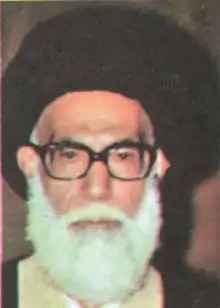Abdol Hossein Dastgheib | |
|---|---|
 | |
| Title | Grand Ayatollah |
| Personal | |
| Born | December 8, 1913 |
| Died | December 11, 1981 (aged 68) Shiraz, Iran |
| Cause of death | Bombing |
| Resting place | Imam Ali Mosque |
| Religion | Usuli Twelver Shia Islam |
| Parent |
|
| Senior posting | |
| Based in | Shiraz, Iran |
| Post | Grand Ayatollah |
Abdol Hossein Dastgheib (8 December 1913 -11 December 1981). He was appointed Imam of Friday Prayer and one of the representatives of the Supreme Leader in Shiraz. He was a Mujtahid, expert in Arabic language, theology, revealed texts, and the principles of jurisprudence (Usul al-fiqh). He was killed by the People's Mujahedin of Iran.
Biography
Dastgheib's father Seyed Mohammad Taqi, who taught elementary education, died when he was 11 or 12 years old. He continued his education after the death his father in Shiraz, then continued his education in Najaf. After returning to Iran, he commenced serious political activities.[1]
Political activities
Before Iranian Revolution
He participated in a political struggle during Pahlavi dynasty. He was imprisoned for criticizing government policies and forced by the regime to leave Iran,[2] returning in 1962.[3] He supported Ruhollah Khomeini and continued to perform political activities against the regime.[4] On June 5, 1963, he was arrested and exiled to Tehran, and in 1964, he was again arrested and sent into exile. He was the leader of people of Shiraz in the struggle against the Pahlavi. In 1977, the regime placed him under house arrest but had to retreat for people's reaction.[5][6] After people were massacred during public demonstrations in Shiraz against shah's regime, he was arrested.[7]
After Iranian Revolution
He was appointed Imam of Friday Prayer and representative of the Supreme Leader in Shiraz,[8] and was a Mujtahidd who was expert in the Arabic language, theology, revealed texts, and the principles of jurisprudence (Usul al-fiqh).[1] He was a representative of the people of Fars in the Assembly of Experts.[9]
Mentors
- Abu l-Hasan al-Isfahani
- Agha Zia Addin Araghi
- Ali Tabatabaei
- Mohammad Kazem Shirazi (from a mentor of ethics and mysticism)
- Mohammad Jawad Ansari Hamedani
- Seyed Mirza Estahbahanati
Books
He authored the following books.[9]
- Everlasting heaven
- Certain role
- Faith
- Resurrection
- Sermon of shabarieh
- Hosseini uprising
- Great sins
- Humble prayers
- Great Fatemeh Zahra and Zeinab
- Ascension to heaven
- Prophecy
- Heart of Quran
- Introduction from the Quran
- Another world
- Islamic behavior
- questions
- Secrecy of the Quran
- Office of Imam (Imamate)
- Truth from Quran
- Eternity
- Friday sermons
- Pure heart
- Manners from the Quran
- Unitarianism
- Fantastic stories
- Sayed-Ol-Shohada
Death
On 11 December 1981, Dastgheib and seven companions were killed in a bomb explosion as they were travelling to the mosque to lead Friday prayer.[8][10] The People's Mujahedin of Iran claimed responsibility for the act.[8]
Gallery
 Abdol Hossein Dastgheib (left) and President Ali Khamenei (right)
Abdol Hossein Dastgheib (left) and President Ali Khamenei (right) Member of Assembly of Experts for Constitution 1979
Member of Assembly of Experts for Constitution 1979
See also
References
- 1 2 "Seyed Abdol-Hossain Dastgheib". Tebyan. 29 December 2004. Retrieved 27 December 2018.
- ↑ "A description of the life of Ayatollah Dashegib". tasnim.
- ↑ "martyrdom of Ayatullah Dashegib".
- ↑ "Ayatollah Dasheghib was martyred". Archived from the original on 2017-05-09. Retrieved 2018-12-12.
- ↑ "Strange sleep of Ayatollah Dashegib before the martyrdom". farsnews. Archived from the original on 2019-04-02. Retrieved 2018-12-12.
- ↑ Fischer, Michael M. J. (June 1, 2003). Iran: From Religious Dispute to Revolution (2nd, With a new introduction ed.). University of Wisconsin Press. pp. 195–197. ISBN 978-0299184742.
- 1 2 3 "Aide to Khomeini Killed by a Bomb". New York Times. 12 December 1981. Retrieved 27 December 2018.
- ↑ Nash, Jay Robert (1998). Terrorism in the 20th Century: A Narrative Encyclopedia from the Anarchists, Through the Weathermen, to the Unabomber. M. Evans and Company, 1998. p. 370. ISBN 9780871318558.